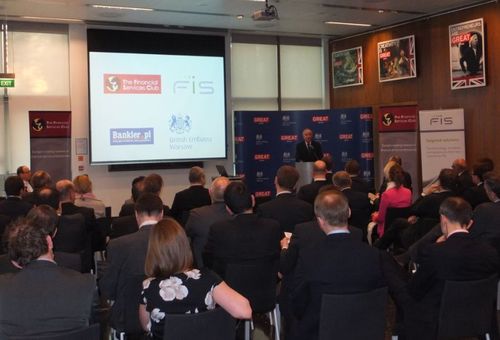
We had our inaugural meeting of the Financial Services Club Poland
last night at the British Embassy in Warsaw.

It was an amazing evening with a packed audience comprising
many of the Presidents of Polish Banks, as well as banks based in Warsaw from
overseas like Deutsche Bank, Saxo Bank and ICBC (the Chinese banks are very active
in Europe).
The event was hosted
by the Embassy and generously supported by FIS and the Bankier, with keynote
Grzegorz Kolodko.
Grzegorz is the former Minister of Finance and Deputy Prime
Minister of Poland, and saw the country through its release from the grip of
the Eastern Bloc in the 1980s through to its accession into the European Union.
In fact, it is the tenth anniversary since Professor Kolodko
signed the accession treaty this year, so who better to open our Financial
Services Club in Poland than him?
The discussion was wide-ranging and covered everything from
Poland’s future to where Europe is heading – and no, it’s not a road to nowhere
– and the role of global superpowers: China, Russia and the USA.
Professor Kolodko is more than capable of discussing these areas,
having travelled to over 160 countries in his life and, as he says, “I don’t
travel to countries but explore them”.
By this, he means that he has met many of the great and good, as well as
the poor and bad, during his journeys.
These explorations resulted in his writing over forty
best-selling books with one, “Truth, Errors and Lies”, translated into most of the world's languages as it exposes the in’s and out’s and up’s and down’s of political integrity and
corruption around the world, as well as a view of new economic models and directions
for societies and countries worldwide.
A fascinating and insightful man, and a natural leader to
open our Club in Warsaw (he also gave our quarterly keynote dinner speech in
London the previous week, so I know quite a lot about how Grzegorz thinks
now!).
Anyway, for those who could not make it, here’s a quick
overview of what happened in Warsaw.
First, Chair of the Financial Services Club Poland
Mieczyslaw Groszek, also Vice President of the Polish Banker’s Association,
welcomed everyone to the evening and introduced the speakers, commencing with the
British Ambassador to Warsaw, His Excellency Robin Barnett.
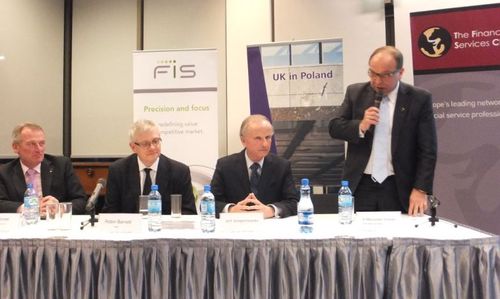
From left to right: Chris Skinner, Robin Barnett, Grzegorz Kolodko and Mieczyslaw Groszek
Robin’s opening words were short but warm, welcoming
everyone to the British Embassy and “the first of series of meetings on topics concerning
financial and economic issues, hosted in partnership with the Financial Services
Club.”
He stressed the UK’s prominence in Europe in the financial markets
and associated services, and that it was timely that we have chosen Poland for
our next area of focus as the Polish economy is the leader in emerging Europe.
He also talked a little about Britain’s stake in the Polish financial
sector with Aviva and RSA in insurance, the Prudential returning to Poland recently
after a break of more than seventy years; RBS and HSBC’s prominence in Corporate
Banking and more.
The Ambassador finished his speech with a few words of remembrance
of Margaret Thatcher, whose funeral took place in London on this day.
Margaret Thatcher played a key role in breaking down barriers
in the Cold War by working with Russia, rather than against the nation, to
produce a credible solution and outcome to the East-West tensions.
Some would even say that without Margaret Thatcher, the whole
dream of glasnost would never have been realised, although that is going a
little bit far for some (wasn’t Mikhail Gorbachev involved?).
Anywise, Kamila Nosarzewska, founder of the Financial
Services Club Poland, then gave a few words of background to the creation of the
Financial Services Club Poland.
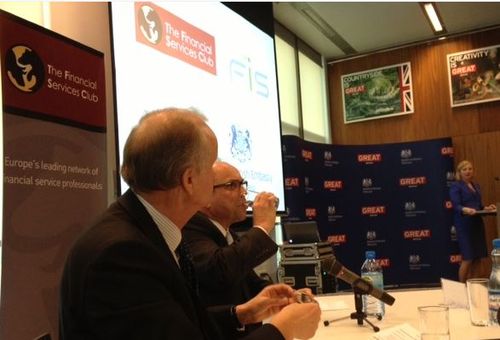
We have had a Financial Services Club in Central and Eastern
Europe for some years based in Austria, but this group serves the interests
primarily of Southern Eastern Europe, rather than Central Europe which is
represented by Warsaw.
Equally, the aim of the Financial Services Club is to build
a presence in all of the major financial
centres of Europe over time, as a network for anyone interested in the future
of banking to build relationships and understanding.
Like a Rotary Club, the Financial Services Club is designed
to be a community project but, unlike the Rotary Club this is for the global
community of banking rather than the local community of commerce.
The original idea of the Club was spawned ten years ago,
when we opened in London in 2004. The
concept was one whereby we all recognised that we meet once or twice a year at
the biggest conferences – SIBOS, EBADay, SIA, ISITC, etc – but what about in-between?
And that is the nature of the Club, to share evenings on a
regular basis to network and to learn.
This is why we will be running meetings every six weeks or
so in Warsaw, as we do in Edinburgh, Dublin, Vienna and London, and any member
of any Club in any city is welcome to join meetings at the Clubs in the other
cities.
With these formalities completed, we then moved on to the
core discussion of the night: what future for the world or, as Professor
Kolodko calls it, whither the economic
outlook? (not wither which would
mean to fail, but whither to mean what direction?).
Purely for convenience, I have written this as my next blog
entry, as some folks would be less interested in the Financial Services Club Poland
and its proceedings than just hearing what a former Deputy Prime Minister of a
key EU member state has to say about Europe’s future … but if you want to just
read it here, then read on!
Whither the economic
outlook? A speech by Professor
Grzegorz Kolodko, former Deputy Premier of Poland
Note: These are the
impressions gained from the speech of Professor Kolodko and not an actual transcript
of his speech.
Good evening and thank you to the British Embassy and the Financial
Services Club for inviting me to be the keynote at their inaugural meeting here
in Poland.
The title of my speech last week at the Financial Services
Club in London was Whither Europe, but
tonight I should look wider and closer afield, at both the global economic
outlook and the local positioning here in Poland.
First and most important is to bear in mind that there are
great things we need to consider.
GREAT-ness
is underscored in this room by these posters about Great Britain and how
Innovation is GREAT, Creativity is GREAT and Entrepreneurialism is GREAT.
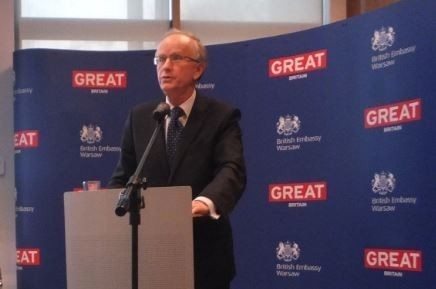
But these signage’s are missing one key aspect
of GREAT-ness. Knowledge.
Knowledge is the key to any successful economy today and
building a knowledge-based economy has to be the key focus for any government if
they want to succeed.
You can see this from India, with their investment in
technology and language knowledge to Poland where we have done the same in building
our language, manufacturing and technology skills to become a leader in
emerging Europe.
However, a knowledge-based economy is no longer good enough in
a globalising economy of commerce. You also
need to encourage multi-culturalism.
Multi-culturalism is critical if you are to attract knowledge
as an economy from those economies that are migrating.
We live today in a world of major migration shifts from East
to West and from West to East.
Chinese and Indian workers are as likely to want to be based
in Europe and America as American and European workers in China and India, and building
a multi-cultural hub for commerce is another critical factor for any successful
economy in this globalised economy.
But multi-culturalism comes at a price and is not easy. As David Cameron recently said at a meeting
with Nicolas Sarkozy and Angela Merkel, “multi-culturalism in Britain is not
working”, and this is worrying as we need globalisation is irreversible.
If we live in a globalising world, that forces a process of
liberalisation and integration. You need
a level playing field for commerce, knowledge, technologies and people to work,
move and migrate to where the opportunities are greatest.
If you stop that process of liberation and integration, then
you become an island set apart from this process, and that is wrong.
An island will wither, whereas an integrated union will
prosper.
This is why the European plan is so important to our future.
We cannot exist in the future as a group of islands, as we
are stronger as a group. We are stronger
united as we are weak when divided.
And this is so true today as we go through this period of
globalising commerce.
In fact, many are watching the European plan with great
interest from Africa, Asia, the Gulf Nations, Latin America and more such that,
by the end of the 21st century, I can see there will be around
fifteen major regionally integrated groups of commerce plus China. China of course is a regional group but,
unlike the United States, is one nation of these groups rather than one group
of member states.
So it is these fifteen groups of nations globally and China
that will be trading by the end of this century, and this is why you need to
integrate, liberalise and co-operate.
That is what the EU has created as a first mover, and what
others will watch and follow.
And, as nations integrate their economies, financial
servicing is a core part of creating such integration. This is why banking and insurance is a
critical component of the EU plan, and is core to creating the Economic and
Monetary Union (EMU) we see today.
So when people say that EMU is becoming unstable – look at
Cyprus, look at Greece, look at Spain – it is the financial markets that will
keep this together or let it fall apart.
Will it fall apart?
I don’t think so.
After all, there is a core piece within this that drives the heart of
the Union and that is the engine state.
The engine state is the nation that keeps the Union
together.
In the old days of the Cold War, the engine state was
Russia.
Russia had created a Union – the United States of the Soviet
Republics, the USSR.
By the 1980s, this Union was challenged, but when Georgia
said we want to leave the Union, did it fall apart? No.
When Uzbekistan or other nations left the Union, did the USSR fall
apart? No.
It was only when Russia left the Union that the Union
disintegrated, as Russia was the engine state.
Now, three decades later, Germany is the engine state.
Will the European Union fall apart if Cyprus leaves therefore? No.
In fact, it will remain even in Spain or Italy or Greece
leave, as long as Germany wants to keep the Union.
And does Germany want to keep this Union?
Absolutely.
Germany has far too much at stake to let it fail, most of
all their own economy.
So I do not believe the EU will fail and I do not think that
Germany will let it fail.
Even with the issues of the last two years, the Union is
still strong, alive and working, and it will continue to do so.
Does that mean that Poland will join the euro, I hear you
ask.
Yes, we will.
It will not be easy, but I see Poland as part of the Eurozone.
Right now, this would be incredibly hard because we have a
very strong currency.
Editor’s note: when visiting
Poland in 2012, the exchange rate was around 6ZTY to the GBP£. On this trip, it was under 5ZTY to the GBP£.
We cannot enter the euro with a strong currency as this
would tie us too far to the Maastricht criteria for membership and then, if our
economy weakened, we would struggle.
And our economic success is slowing. The forecast for this year is less than two
percent growth and next year nears one percent.
So we will have to wait for the Zloty to become weaker.
Sure, some of you might say that we could go back and
renegotiate the entry criteria, but that will not happen. In order to gain more derogations for Poland
or change the entry criteria would mean renegotiating the agreed Constitution
of the European Union, and that will not happen.
So we have to wait until the conditions are right to join,
when the Zloty and the economy is weaker.
At this point, we will join and the challenge then is to
ensure the people are in favour.
Now that is a difficult task and, although David Cameron
talks about having a Referendum to join the euro, this is not the route we
should follow.
A Referendum sends a clear signal that you can say No, and
the media are very good at making sure that people say no. A Referendum is therefore a trap to try to
prove it is popular and the right thing to do, but more likely to result in a
campaign to ensure it is unpopular and voted out for the long term.
I do not see that we should choose a Referendum, but to
ensure our campaign of reasons to join is well understood and supported.
And our reasons to join are many, as stated: to be part of a
commercial region in a global world of commerce that can compete as a knowledge-based
economy on a level playing field with the
rest of the world.
Once the Zloty weakens to a point of achieving the joining criteria,
we will join and then we will enjoy export-led growth once again.
This will then put other nations like Sweden and Denmark in
a difficult position, as they will feel compelled to join too.
That will leave the UK weaker, as one of the few major commercial
nations sitting outside the Eurozone.
Will the UK join the Eurozone? I do not think so. In fact, I think they never will as the City
of London is too strong a force as a global hub to be part of a regional hub.
The City is not the UK, but a world centre with Deutsche
Bank, BNP Paribas, JPMorgan and many non-UK and non-European financial organisations
based there.
Therefore, to become part of a regional centre would probably
undermine that position and the UK would not want this to happen.
Nevertheless, it would be interesting to see what would
happen if the UK went for devolution of Scotland and Wales, and if Scotland and
Wales then adopted the euro.
That would be interesting.
Anyway, I do not see this happening, leaving us with a Eurozone
of 18 nations more or less, joined by a currency with a Banking Union and
fiscal co-ordination across borders.
It is only through this process that we can compete in this
global world of commerce.
A final thought, before I close.
Everyone talks about Turkey being part of the European Union
and, over time, the euro.
Why?
Why would Turkey join Europe?
For the reasons we want to be a part of this region?
For commerce, competition, economic migration, inward investment
and more?
Yes, but this would undermine their role in the Arab World.
Turkey hold great influence over the Arab States, and are
just as important to these nations as they are to the European world.
Therefore, Turkey’s role is a critical one, holding the balance
between West and East, Europe and the Middle East, Christian and Islam worlds.
They have always held this balancing card, and they still hold
this card today.
Joining the European Union would tip the balance against the
Middle East and so I do not see Turkey doing this. They will always walk the line between East
and West, and balancing the interests of both.
In conclusion Ladies and Gentlemen, I see a world that is liberalising
and integrating through the forces of global competition.
Nations cannot be isolated from this process, which is irreversible,
but must be part of this to be part of the future.
The biggest challenge in all of this is then how to govern.
How do you govern connected economies without connected governments?
That is the biggest question for the future.
Is the answer the G20?
Maybe. It is surely
better than the G8 or G7.
Is it the United Nations?
We have not answered this question yet, and this will be
piece that will be the biggest change for the foreseeable future.
In conclusion, we are moving to an integrated world of
regional commerce with many regionally integrated economies trading under
unified agreements for trade. It will
not be an easy future, but it will be a far better one if we war with trade
rather than with people.
Thank you.
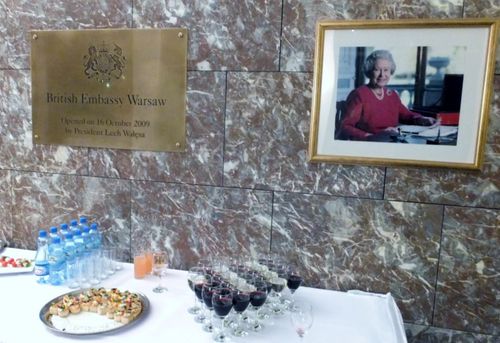
Our next meeting is on 5th June with Dave Birch, Supergeek and Digital Money Supremo discussing the Future of Money with Jakob Gorka of Warsaw University. If you want to come, please register here.
Meanwhile, the Financial Services Club has produced research around SEPA, the PSD and the European Payments Landscape to coincide with EBA Day over the past four years, in partnership with Logica (now part of CGI) and EBA CLEARING. This year’s research is underway and we would ask you to answer a few short questions by clicking here.
Chris M Skinner
Chris Skinner is best known as an independent commentator on the financial markets through his blog, TheFinanser.com, as author of the bestselling book Digital Bank, and Chair of the European networking forum the Financial Services Club. He has been voted one of the most influential people in banking by The Financial Brand (as well as one of the best blogs), a FinTech Titan (Next Bank), one of the Fintech Leaders you need to follow (City AM, Deluxe and Jax Finance), as well as one of the Top 40 most influential people in financial technology by the Wall Street Journal's Financial News. To learn more click here...

